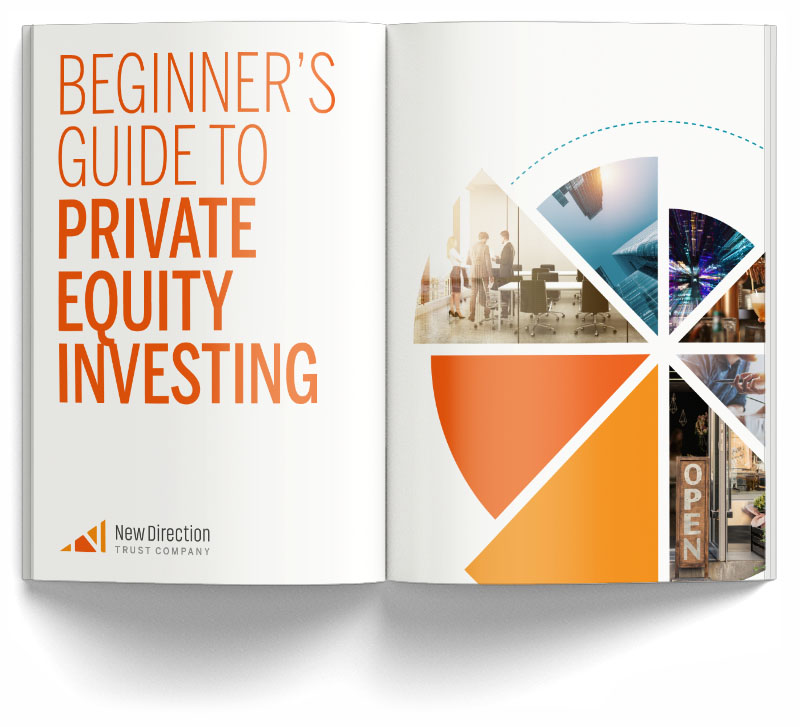INVESTMENT GUIDE
Private
Equity
Build a stake in the next big start-up through private stock offerings or crowdfunding platforms.

Table of Contents

AT A GLANCE
What Should You Know About Private Equity?
Any account offered by NDTCO can invest in private equity. The ability of your account to invest in a private company gives you the opportunity to exercise your personal market knowledge and investment expertise.
Investing in a privately owned business or entity with your account may sound unfamiliar since most IRA providers only allow account holders to purchase publicly traded stocks, bonds, and funds as investments. However, private equity is an available asset to your retirement account with New Direction Trust Company.
The returns of a private equity investment can generate retirement wealth that is tax-deferred or tax-free depending on the account type. The IRA ownership of private equity is usually expressed as a percentage of ownership or shares of stock.
Investing in private equity as an asset in your self-directed IRA is one way to diversify your retirement portfolio. Unlike publicly traded securities, private equity does not have public disclosure laws associated with it. Therefore, the investor can use personal knowledge and experience when investing in private companies with a self-directed IRA.
You, the IRA holder, select a company/entity in which you’d like to invest. You agree on terms with the company and direct us to send money from your IRA to close the deal. We make sure that the paperwork substantiates that the private equity investment is owned by your IRA, and therefore deserves the tax benefits associated with the account type.
Possible Structures
- Limited Partnerships
- Limited Liability Companies
- Pre-IPO Companies
- C-Corps
- Limited Liability Partnership
- Land Trusts
- Franchise Businesses
- Start Ups (banks or companies)
*An IRA can’t invest in an S-Corp, nor can it be a General Partner in a General Partnership.
Due Diligence
As the IRA holder, you are responsible for performing due diligence on your IRA’s investments. Neither the IRS nor NDTCO researches or endorses the investments, businesses, or principals involved in your IRA’s transactions. A competent professional in the legal, financial advice or accounting fields can also be engaged if you need additional help deciding if the investment being considered is legitimate, meets your risk tolerance, and is right for your investment goals.
New Direction Trust Company reviews the investment documents to ensure it contains the required content, however it is your responsibility to create, monitor and execute the terms and conditions of your investments.
Disqualified Persons
All IRAs have a list of people who are disqualified from having certain interactions with that account (called Disqualified Persons). Below is a graphic that depicts related persons that are considered to be “disqualified” by the IRS. Keep in mind that any entity that is owned or controlled by a Disqualified Person or combination of Disqualified Persons may also be disqualified. Visit this page for everything you need to know about disqualified persons or prohibited transactions.
Additionally, you cannot receive the dividend or distribution payments personally, they must come to the account. You cannot invest retirement funds with a disqualified person or entity. You can learn more about Prohibited Transactions here.
NON-DISQUALIFIED PERSONS INCLUDE:
- Brother
- Sister
- Brother-in-law
- Sister-in-law
- Niece
- Nephew
- Aunt
- Uncle
- Cousin
DISQUALIFIED PERSONS & ENTITIES INCLUDE:
- The account holder (you)
- The account holder’s linear ascendants (parents, grandparents, etc.)
- The account holder’s linear descendants (children, grandchildren, etc.) and their spouses
- Fiduciaries to the account (accountants, financial advisors, attorneys, etc.)
- Tax-advantaged savings accounts held by any of the aforementioned individuals
- Businesses or entities owned or controlled by any of the aforementioned individuals
- Spouse
- Children of spouse
Asset and Liquidity Considerations
It is important to make sure the entity in which you would like to invest will allow the ownership to be assigned or reassigned if you think that you may convert, transfer, or distribute all or part of your IRA investment in the future. Also, keep in mind that some investments do not allow the investor to sell ownership units or withdraw funds during a fixed period. The liquidity of your investment is an important piece of your due diligence. If you happen to be in a required minimum distribution status, this may affect your ability to take your mandatory distributions from the account.
Fees
ANNUAL ADMINISTRATION FEES
(Assessed and billed annually per asset)
| Private Equity Assets | $390 per asset |
PROCESSING FEES
| Purchase, Sale, or Exchange | $130 |
OUTGOING MOVEMENT OF FUNDS
Due when funds leave your account
| ACH | $0 |
| Check | $20 |
| Cashier or Official Bank Check | $35 |
| Wire | $35 |
| International Wire | $35 |
| Overnight Mail | $50 |
| Returned Item or Stop Payment Request or Void Check | $50 |
TRANSFERS OUT AND DISTRIBUTIONS
| In-Kind Asset Registration | $75 |
| Transfer Out and Distribution | $150 |
Transfers out and distributions carry the charges above plus applicable movement of funds fees. Required Minimum Distributions (RMDs) are only charged applicable movement of funds fees and in-kind asset re-registration fees.
- Annual Administration fees are charged based upon the custodial services provided and are not dependent upon an investment’s performance. Thus, Administration fees are non-refundable regardless of whether the client is unable to generate profits or returns.
PRIVATE EQUITY INVESTING
Investment Process
The Investment Timeline
Log into the NDTCO Client Portal to get started.
STEP 1
Open Account
Completed online within minutes
STEP 2
Fund the Account
1-4 weeks
STEP 3
Find Investment
Timeline varies
STEP 4
Assemble Documents
1-2 business days
STEP 5
Investment Funding
3 business days
Assemble Documents
For the most expedient processing, please read this section carefully and review all investment documentation to ensure it is completed correctly. Any errors in the paperwork will delay the funding of your investment. Once your account is open and funded, begin gathering all required investment documents and return them to NDTCO with correct IRA titling, “Read and Approved” signatures.
In order to have sufficient time for required compliance review and processing, NDTCO needs to have completed paperwork 3 business days prior to funding. The three-day period begins when we have received ALL the required paperwork and information. Forms received after 12:00pm Mountain Time will be considered as having arrived next business day.
Upload copies of all signed documents for the transaction to NDTCO while completing your online Private Equity Buy Direction Letter or through your client portal in the messaging center.
In order to submit your Private Equity Buy Direction Letter you will need to ensure you have sufficient cash in the account. If at the time of a purchase you don’t have sufficient cash in the account, consider a transfer-in, Rollover, Liquidation or contribution to fund the account before your purchase. If you are working with us already on a sale or funding request, check your account daily for incoming funds. As soon as funds clear in your account, you will be able to submit your purchase request.
Required Documents
Private Equity Required Document Checklist
- Private Equity Buy Direction Letter
- Subscription Agreement provided by investment entity or their legal team titled in the name of the IRA
- Payment Instructions
Private Equity Required Document Checklist (for fewer than 10 total investors)
- Operating Agreement for the entity
- TIN/EIN of the entity
- Certificate of good standing/articles of incorporation
- Manager’s Acknowledgment Letter – completed by manager
- Upon reviewing the documentation, we may ask for additional paperwork (i.e. if there is only one member, it’s probably a Closely Held LLC or Entity).
Titling Instruction/Buyer Information
The name of the investor on any subscription or operating agreement should read; NDTCO as custodian FBO Client’s Name IRA, and not your personal name.
- Wire instructions or check delivery instructions
- Subscription Agreement or Stock Purchase Agreement (provided by the issuer, reviewed by NDTCO)
- New Direction Trust Company’s address as that of the investor
- The IRA’s Tax ID Number – 20-0157510
- Number of shares or percent membership
- Price per share/unit
- Total purchase price
- Investor’s signature line left blank
- Under no circumstances should a client’s social security number be used in any investment documents
Signature Lines on Investment Documents
DO NOT SIGN ON THE SIGNATURE LINE. As the custodian for your IRA account, NDTCO is the authorized signer for your account; any documents that are signed on the signature line by the IRA holder will be sent back for correction.
PRIVATE EQUITY INVESTING
After the Purchase
Capital Calls & Additional Funding
A capital call, installment or additional funding is very similar to the initial purchase process.
Required forms for an additional funding are:
- Private Equity Buy Direction Letter – Reflecting the new amount to be funded
- Wire instructions if funding via wire
- Capital Call Letter – Entity will supply the Capital Call Letter OR a new Subscription Agreement. For additional funding, a new purchase or subscription agreement may be required by the entity.
- If the entity is a Closely Held LLC that is managed by the client, the capital call letter can be written and signed by the client/manager.
Please note that additional funding depends on whether the operating agreement of the company allows for it.
Selling your IRA Owned Private Equity/Stock
If you would like to sell your IRA-owned private stock, you will first need to find a buyer to purchase the private stock. Typically, stock will be purchased by the entity you invested in or a private individual. There are some disqualified persons to whom you cannot sell your private stock. Remember, disqualified persons include you, your spouse, your parents and grandparents, your children and their spouses, as well as some business partners/fiduciaries. The fees associated with a Private Equity Sale include a transaction fee.
To process a sale of private stock, New Direction Trust Company will need the following items:
- Sell Direction Letter – This form is used to instruct the sale of private equity.
- We will request an assignment letter if you are selling to a private individual.
- Payment- The client must work with their investment provider to arrange payment, ensure payment is made out to the IRA titling, and ensure payment to NDTCO.
New Direction Trust Company requires your complete, correct paperwork 3 full business days prior to the sell date. NDTCO does not work with the investment to negotiate or effectuate the sale.
Prohibited Transactions
A prohibited transaction is any transaction that takes place between an IRA and any disqualified person or entity. The following actions are considered prohibited transactions and could result in the distribution of this asset from your plan and may also include IRS penalties. Prohibited transactions apply to all disqualified persons to your plan.
- Engaging in a private equity transaction (buy, sell or any other type of transaction) between your account and a disqualified person
- Yield a commission/fee for the purchase, sale, or exchange of assets
- Cover account expenses with personal, non-account funds
- Use of your IRA’s assets as collateral for a personal loan
- Use of your IRA’s assets to guarantee credit for a loan
- Receive dividend, distribution or sale payments directly instead of having them go to the IRA
While we can share IRS rules with you, NDTCO does not give tax, legal or investment advice so you may be referred to your financial or legal representative for further details or a possible solution.
All expenses for the investment are the IRA’s responsibility. Never pay any bills with personal funds. Such payments may be considered prohibited transactions, which could jeopardize the tax-advantaged status of your IRA.
Cash Flow
All earnings from private equity investments must flow directly back to your retirement account. Ensure that your investment knows to send any dividends, profits, returns of capital or sale proceeds back to your NDTCO IRA, not to your personal bank account. Receiving any of these payments personally, instead of through the IRA, may be construed as a prohibited transaction and result in the distribution of the IRA entirely along with taxes and penalties.
Payments back to your retirement account can be made through the following options:
Checks Mailed to NDTCO
- We cannot deposit any earnings from your investments via check into your IRA that are made payable to you personally. Any such checks will be returned. All checks need to be accompanied by a deposit coupon.
- Ensure the checks are payable to your IRA as follows: NDTCO, as Custodian, FBO Client’s Name IRA.
- There is a 5-business day hold on incoming checks beginning on the date of deposit.
- Checks can be mailed with the deposit coupon to our office:
- New Direction Trust Company
1070 W. Century Drive.
Louisville, CO 80027
- New Direction Trust Company
Deposit Service
- If you are expecting regular ACH dividends, we can help you by setting up a complimentary deposit service for those dividends to flow into. Once the deposit service is set up, it will be specific to your NDTCO account and a single asset in your account. You will receive a specific ABA/routing number and account number via portal message, which you can give to your investment for setting up direct deposits. No fees apply for the complimentary deposit service, this is included in your NDTCO annual administration fee.
- For NDTCO to establish a deposit service account, please submit a portal message request online. You will need to provide the following information…
- Type of deposit (contribution, rent, dividend, etc.)
- Asset the deposit is associated with
- Percentage of ownership if it’s split with another account holder
- Which account is applicable if you have more than one account.
Transfers Out/Distributions
In the event you would like to transfer or distribute all or part of your IRA investment in the future, make sure the entity in which you would like to invest will allow the ownership to be assigned or reassigned. Keep in mind that some investments do not allow the investor to sell ownership units or withdraw funds during a fixed period. If you happen to be over the required minimum distribution age and have a traditional IRA, this may affect your ability to take your mandatory distributions from the account.
- If your distribution strategy or required minimum distributions are cash based, you will need to plan ahead to make sure your cash flow matches your cash distribution needs.
Legal/Accounting Fees
- If fees or bills need to be paid, such as legal or accounting fees that relate to the investment, those should be paid out of the IRA using our online Bill Pay System.
Annual Fair Market Valuation
Per IRS regulations, each retirement account must be valued annually. Once per year, NDTCO accounts that hold private equity must complete a Fair Market Valuation (FMV).
Supporting documentation from a qualified 3rd party is required for the valuation to be processed. 3rd party documentation may include a valuation letter or annual shareholder statement from the investment company, a CPA, an attorney, or a public document.
Supporting documents not accepted: Schedule K-1s (which report annual earnings or losses but not fair market values), documents older than 6 months from creation date, recorded phone conversations, or e-mails do not constitute valid supporting documentation.
Failure to provide an annual valuation may result in the taxable distribution of your asset. Accounts that have shown no activity, including the valuation, will not be held by NDTCO because we cannot meet the IRS requirement to annually update the value of your IRA and file an accurate IRS Form 5498 for your account.
To complete a Fair Market Valuation Form, please:
- Log into the NDTCO Client Portal.
- On the Overview page, find the appropriate asset and select Take Action in the right-hand column, and then choose Valuate.
- Provide any requested information and upload your supporting documentation.
- Agree to the Terms & Conditions and click Submit. Done!
In-Kind Distributions
To take an in-kind distribution, the following items are needed….
- Distribution and Notice of Withholding Form – this can be completed through your client portal. To access the form login to your client portal and select ‘Distributions’ from the left-hand options. Complete the section for in-kind distributions.
- Updated Subscription Agreement from the company, showing the updated investor as yourself instead of your IRA (with the client’s read and approved).
- Fair Market Valuation (FMV) will need to be completed with documentation submitted within the past year prior to the distribution. The FMV requirement is waived if the asset was purchased by your account within the past year prior to the distribution.
In-kind distributions will incur both a distribution fee (unless the client is taking an RMD) and an in-kind asset re-registration fee. Please refer to our fee schedule for details.
In-Kind distributions are reported as income on tax form 1099, please seek counsel from a qualified tax professional if you have any questions about the form or how to report it with your taxes.
Private to Public Equity Conversion
To convert your asset, the following items are needed:
- Publicly Traded Securities Conversion Form
- Supporting documentation of the Conversion from your Investment Company (Letter, Memo, Email, etc.)
- Current Account Statement from Investment, Holding Agent or Transfer Agent (within the last 60 days).
Once we have received all the required documents, we are able to begin processing your asset conversion.
Unrelated Debt-Financed Income (UDFI/UBIT)
Earnings from some investments may be subject to Unrelated Business Income Tax. If your investment’s entity has earnings from the sale of goods/services or earnings from debt, consult with your tax professional to determine if UBIT is owed. You, as the IRA holder, are responsible for determining if the earnings are taxable or not. If so, you must file form 990-T with the IRS.
NDTCO does not calculate UBIT or submit form 990-T. Click here to download our free UBIT calculator.
See here for more information on UDFI, UBTI, and UBIT.
Managing Your Account
Our online client portal combines human power and digital innovation, making it simple to view all your account information in one centralized location. Within the client portal, you have the ability to directly message our support team, review recent transactions, download account documents, and review a vast library of educational content easily and securely.
Simply log into our Client Portal to access and manage all of your account information.
Forms
- Private Equity Buy Direction Letter-This form directs us to purchase the asset. This form can be accessed through your client portal from the Invest tab on the lefthand side.
- Sell Direction Letter-This form directs us to sell the asset. Please upload supporting documentation while completing the Sell Direction Letter.
- Distribution and Notice of Withholding Form– To access the form login to your client portal and select ‘Distributions’ on the lefthand side.
- Publicly Traded Securities Conversion Form-The Publicly Traded Securities Conversion Form is used if your NDTCO account holds an investment that was previously a private investment, but the company has since had an IPO and your stock needs to be converted from private to public.
- Manager’s Acknowledgment Letter – Required document for Private Equity transactions with fewer than 10 total investors. To be completed by the manager.

FAQ
What fees are needed to open an account?
A one-time Application Fee is due at the time the account is established. You can view our full fee schedule here.
Which accounts are eligible?
Any account offered by NDTCO can invest in Private Equity.
Can NDTCO help me invest?
As the IRA holder, you are responsible for performing due diligence on your IRA’s investments. Neither the IRS nor NDTCO researches or endorses the investments, or investment providers, involved in your IRA’s transactions. A competent professional in the legal, financial advice or accounting fields can also be engaged if you need additional help deciding if the investment being considered is legitimate, meets your risk tolerance, and is right for your investment goals.
What about Capital Calls & Additional Funding?
Required forms for an additional funding are:
- Private Equity Buy Direction Letter – Reflecting the new amount to be funded
- Funding Instructions – Check, ACH or wire instructions from the entity
- Capital Call Letter – Entity always supplies this document OR Subscription Agreement – For additional funding, a new purchase or subscription agreement may be required by the entity.
- If the entity is a Closely Held LLC that is managed by the client, the capital call letter can be written and signed by the client/manager.
Please note that additional funding depends on whether or not the operating agreement of the company allows for it.
Are there Fair Market Valuation requirements?
Per IRS regulations, each retirement account must be valued annually. Once per year, NDTCO accounts that hold private equity must complete a Fair Market Valuation (FMV).
Supporting documentation from a qualified 3rd party is required for the valuation to be processed. 3rd party documentation may include a valuation letter or annual shareholder statement from the investment company, a CPA, an attorney, or a public document.
Supporting documents not accepted: Schedule K-1s (which report annual earnings or losses but not fair market values), documents older than 6 months from creation date, recorded phone conversations, or e-mails do not constitute valid supporting documentation.
Failure to provide an annual valuation may result in the taxable distribution of your asset. Accounts that have shown no activity, including the valuation, will not be held by NDTCO because we cannot meet the IRS requirement to annually update the value of your IRA and file an accurate IRS Form 5498 for your account.
To complete a Fair Market Valuation Form, please:
- Log into the NDTCO Client Portal.
- On the Overview page, find the appropriate asset and select Take Action in the right-hand column, and then choose Valuate.
- Provide any requested information and upload your supporting documentation.
- Agree to the Terms & Conditions and click Submit. Done!
What is UBIT?
Unrelated Business Income Tax (UBIT) applies to debt financed property in IRAs and also applies to operating income received from companies owned by IRAs and qualified plans. Typically, the debt financed income is taxable under UBIT rules for the percentage of property that is debt-financed.
See here for more information on UDFI, UBTI, and UBIT.
Does UBIT apply?
Earnings from certain investments may be subject to Unrelated Business Income Tax or UBIT. The IRA pays this tax, not you personally. Consult with your tax professional to determine if UBIT is owed. If so, you would file a form 990-T with the IRS for your IRA.
What is a prohibited transaction?
A prohibited transaction is any transaction that takes place between an IRA and any disqualified person or entity. The following actions are considered prohibited transactions and could result in the distribution of this asset from your plan. Prohibited transactions apply to all disqualified persons to your plan.
- Engaging in a private equity transaction between your account and a disqualified person
- Yield a commission/fee for the purchase, sale, or exchange of assets
- Cover account expenses with personal, non-account funds
- Use of your IRA’s assets as collateral for a personal loan
- Use of your IRA’s assets to guarantee credit for a loan
- Receive dividend or distribution payments directly instead of having them go to the IRA
While we can share IRS rules with you, NDTCO does not give tax, legal or investment advice so you may be referred to your financial or legal representative for further details or a possible solution.
All expenses for the investment are the IRA’s responsibility. Never pay any bills with personal funds. Such payments may be considered prohibited transactions, which could jeopardize the tax-advantaged status of your IRA.




OTHER INVESTMENTS
The world is your portfolio
Why stop at precious metals? With a self-directed account, you have the freedom to invest your tax-advantaged retirement or savings funds in the assets you’re most passionate about.
From start-ups to small businesses, if you can find it, we will help you fund it.






